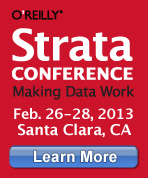Here are a few stories from the data space that caught my attention this week.
Big data needs a bigger forecast
The International Data Corporation (IDC) released a forecast this week, projecting “the worldwide big data technology and services market will grow at a 31.7% compound annual growth rate (CAGR) — about seven times the rate of the overall information and communication technology (ICT) market — with revenues reaching $23.8 billion in 2016.”
According to the press release, findings from IDC’s research also forecasted specific segment growth, including 21.1% CAGR for services and 53.4% for storage. GigaOm’s Derrick Harris says IDC’s research “only tells part of the story” and that the market will actually be much bigger. For instance, Harris notes that the report doesn’t include analytics software, a critical component of the big data market that the IDC predicts will hit $51 billion by 2016. And what of the outliers? Harris writes:
” .. .where does one include the rash of Software-as-a-Service applications targeting fields from marketing to publishing? They’re all about big data at their core, but the companies selling them certainly don’t fit into the mold of ‘big data’ vendors.”
Harris highlights potential problems the IDC might have in maintaining their report segments — servers, storage, networking, software and services — with more and more cloud providers hosting big data applications and startups offering cloud-based big data services; calculating these revenues will be no easy feat, he writes. You can read Harris’ piece in full at GigaOm.
 Strata Conference Santa Clara — Strata Conference Santa Clara, being held Feb. 26-28, 2013 in California, gives you the skills, tools, and technologies you need to make data work today. Learn more
Strata Conference Santa Clara — Strata Conference Santa Clara, being held Feb. 26-28, 2013 in California, gives you the skills, tools, and technologies you need to make data work today. Learn more
Renewed FISA Amendments Act authorizes “unprecedented snooping” in EU
Slate’s Ryan Gallagher took a look this week at a new report produced by the Centre for the Study of Conflicts, Liberty and Security for the European Parliament that focuses on the Foreign Intelligence and Surveillance Amendments Act (FISA), which was recently renewed through 2017. Gallagher reports that the new report, “Fighting Cyber Crime and Protecting Privacy in the Cloud,” says the law “poses a ‘much graver risk to EU data sovereignty than other laws hitherto considered by EU policy-makers.”
The FISA Amendments Act of 2008, Gallagher notes, legalized a warrantless wiretapping program after 9/11. There was much ado about how this might affect U.S. citizens, but Caspar Bowden, co-author of the new report, told Gallagher that foreign citizens should be even more concerned. Gallagher reports:
“According to Bowden, the 2008 FISA amendment created a power of ‘mass surveillance’ specifically targeted at the data of non-U.S. persons located outside America, which applies to cloud computing. This means that U.S. companies with a presence in the EU can be compelled under a secret surveillance order, issued by a secret court, to hand over data on Europeans. Because non-American citizens outside the United States have been deemed by the court not to fall under the search and seizure protections of the Fourth Amendment, it opens the door to an unprecedented kind of snooping.”
Gallagher writes that U.S. officials deny any such snooping, but Bowden’s report nonetheless calls for a warning for EU citizens that their data could be vulnerable. He also notes that the report includes a proposal that EU citizens be granted equal protection in American courts. You can read Gallagher’s full report at Slate.
Big data in daily life
While big data is spurring major change for organizations and research groups worldwide, it’s also effecting change on a much more personal level, argues Niall Harbison at The Next Web. “We’re witnessing the emergence of the ‘self tracking’ phenomenon,” he writes, “being led by the likes of the Quantified Self group, a movement which promotes learning more about yourself through smart tracking and analysing personal data.”
Harbison looks at some emerging technologies that are affecting our daily lives, including apps such as Nike Run Plus and Mood Panda that inform self-analysis, tools like OPower and Mint that help users save money, and data tracking app Onavo Count that can warn you if you approach your smartphone data limit and even make recommendations for data plan adjustments based on your usage. Harbison also delves a bit into the Internet of Things, looking at such innovations as SleepShirt smart pajamas and the Pebble watch.
In similar vein, Siddharth Taparia, SAP’s senior director of portfolio and strategic marketing, writes at Forbes that “2013 may be a year when Big Data moves from the technical to the practical, as real consumers and citizens start seeing its impact.” He outlines five areas that will experience big changes, including how and where we spend money, how we vote, how we study and how we stay healthy.
Taparia also addresses data privacy, noting that regardless of expressed concerns over the collection, analysis and sale of personal data, consumers continue to willingly share their information. Taparia warns that in addition to trusted government agencies or companies looking to trade a deal or discount for information, big data “also attracts hackers and identity thieves,” and notes that “[s]avvy consumers will understand how and where to best share their data, and what they get in return.”
Tip us off
News tips and suggestions are always welcome, so please send them along.
Related:
